Grooming your furry friend can be a rewarding experience, but many aspiring groomers wonder, do you need a license to groom dogs? The answer isn’t always straightforward and varies depending on where you live and the type of grooming services you offer. This article will delve into the licensing requirements for dog groomers, helping you navigate the regulations and understand what you need to do to operate legally and ethically.
Understanding Dog Grooming Regulations
Before you start clipping and primping, it’s crucial to understand the legal landscape surrounding dog grooming in your area. Some jurisdictions require formal licensing, while others have less stringent rules. The specific regulations often depend on the services you provide. For example, offering basic bathing and brushing might not require a license, but more advanced services like teeth cleaning, nail clipping, or haircuts could. It’s always best to check with your local authorities, such as your city or county clerk’s office, or a professional organization like the National Dog Groomers Association of America, for the most up-to-date and accurate information. This will help you avoid potential legal issues and ensure you’re operating within the bounds of the law.
Licensing Requirements: State by State Variations
Licensing requirements for dog groomers vary significantly from state to state. Some states have established specific licensing boards for pet groomers, while others regulate grooming under broader animal care laws. In some states, you might need to obtain a specific dog grooming license, while in others, a general pet care license might suffice. Some states have no specific licensing requirements at all. This patchwork of regulations can be confusing, so research is key. Contacting your state’s Department of Agriculture or Veterinary Medical Board is a good starting point. They can provide information on your state’s specific requirements.
Why Are Licenses Important?
 The Importance of Dog Grooming Licenses
The Importance of Dog Grooming Licenses
Licenses aren’t just bureaucratic hurdles; they serve important purposes. They help ensure a certain level of competency and professionalism within the industry. Licensing often involves meeting specific educational requirements, passing exams, or demonstrating practical skills, which helps protect animals from unqualified practitioners. It also provides a level of consumer protection, giving pet owners confidence that they are entrusting their furry companions to someone who has met specific standards.
Consequences of Grooming Without a License
Operating a dog grooming business without a license where one is required can have serious consequences. You could face fines, legal action, or even have your business shut down. More importantly, operating without proper training or certification can put animals at risk. Improper grooming techniques can lead to injuries, stress, and even infections. By obtaining the necessary licenses and certifications, you demonstrate your commitment to animal welfare and professional ethics.
FAQs
- Do I need a license for mobile dog grooming? This depends on your local regulations. Mobile grooming services are often subject to the same licensing requirements as brick-and-mortar businesses.
- How long does it take to get a dog grooming license? The timeframe varies depending on the specific requirements in your area. It could take anywhere from a few weeks to several months.
- What qualifications do I need to become a licensed dog groomer? Requirements vary, but some common ones include completing a certified grooming program, passing an exam, and demonstrating practical skills.
- Where can I find information on licensing requirements in my area? Contact your local city or county clerk’s office, your state’s Department of Agriculture, or a professional organization like the National Dog Groomers Association of America.
- Is it legal to groom dogs in my home without a license? Even if you’re grooming dogs in your home, you might still need a license, especially if you’re charging for your services. Check your local regulations.
- What are the benefits of getting a dog grooming license? Licensing demonstrates professionalism, helps ensure animal safety, provides consumer protection, and can boost your business credibility.
- What happens if I get caught grooming dogs without a license? You could face fines, legal action, or have your business shut down.
Related Articles
- mobile dog grooming franklin tn
- mobile dog grooming worcester
- dog kennels bury st edmunds
- dog kennels donegal
About ILM Dog
ILM Dog is your one-stop resource for expert advice on dog breeds, health, training, nutrition, grooming, and much more. We offer valuable insights for both new and experienced dog owners, covering everything from puppy care to senior dog needs. We strive to empower dog owners with the knowledge they need to provide the best possible care for their beloved companions. For expert advice and personalized guidance, contact us at [email protected] or call us at +44 20-3965-8624.